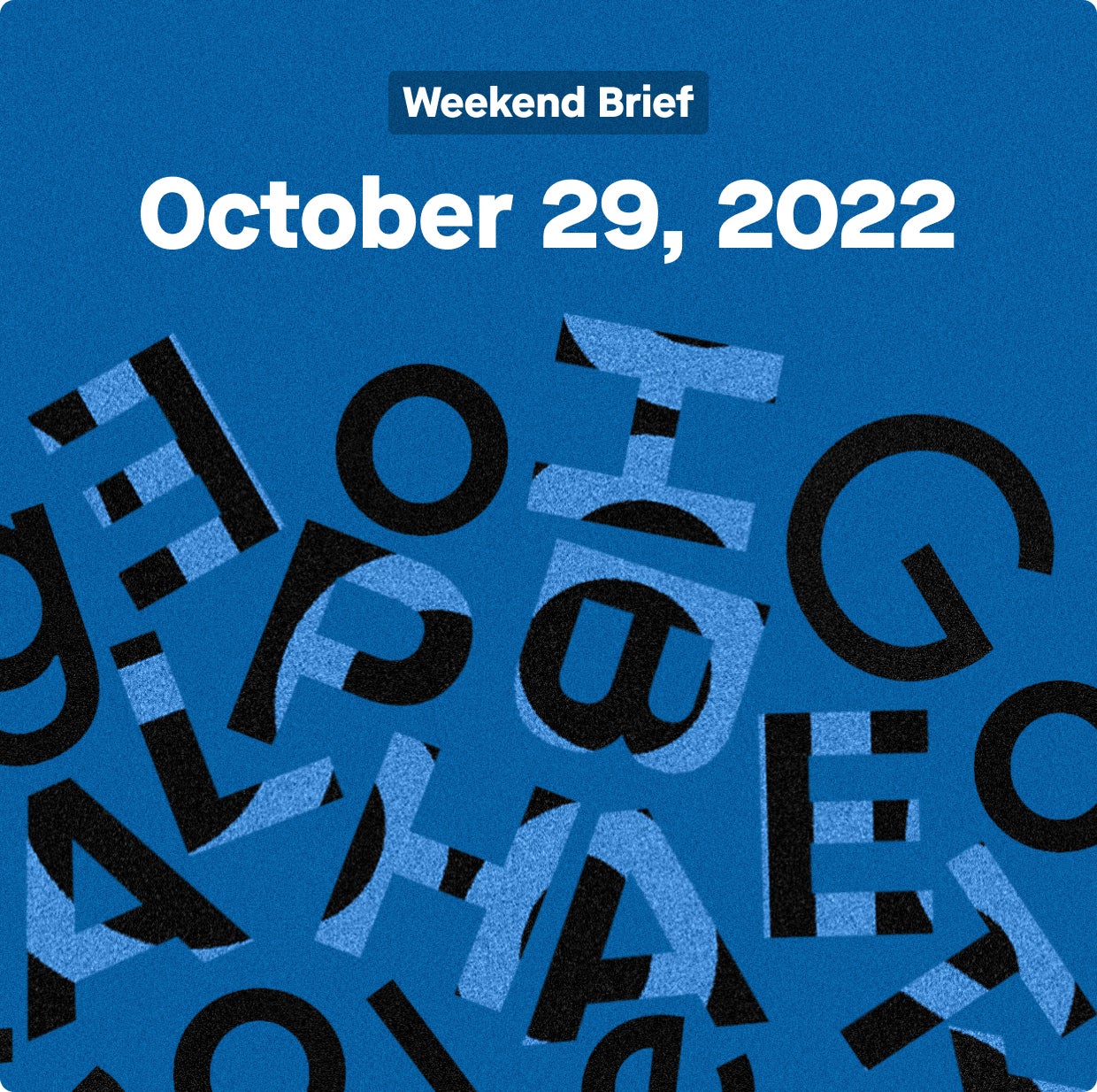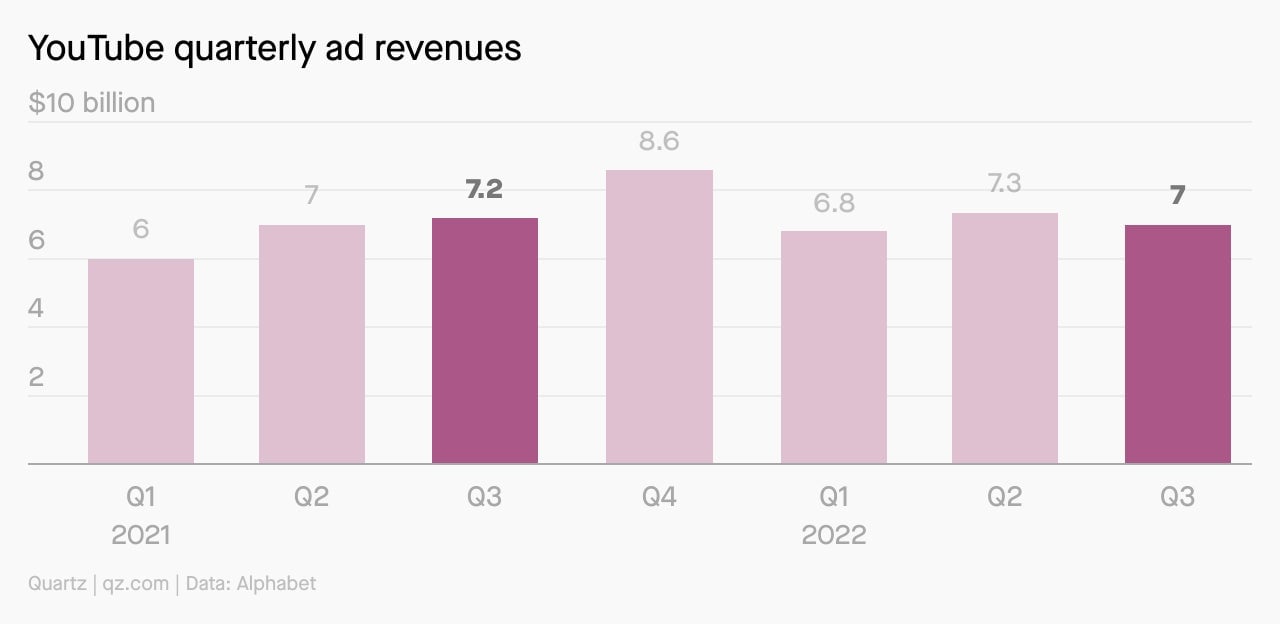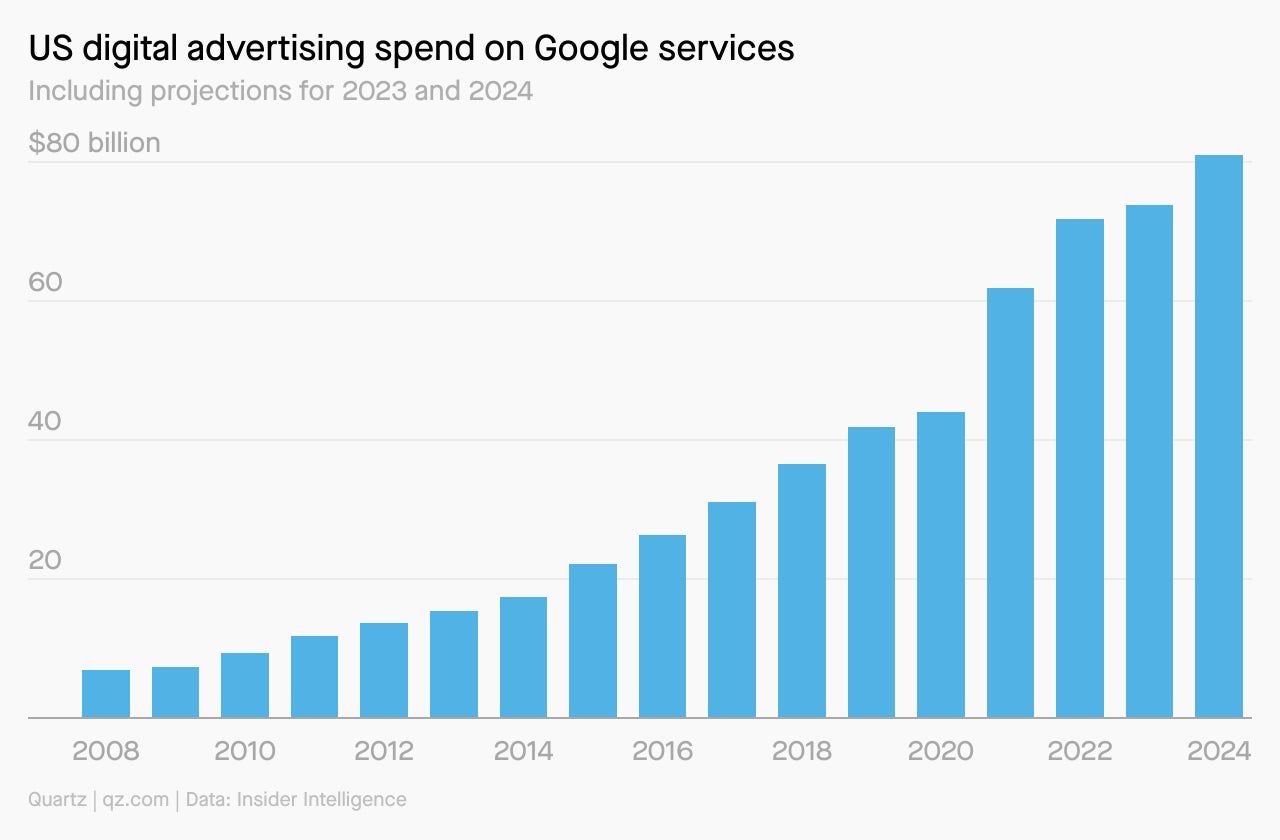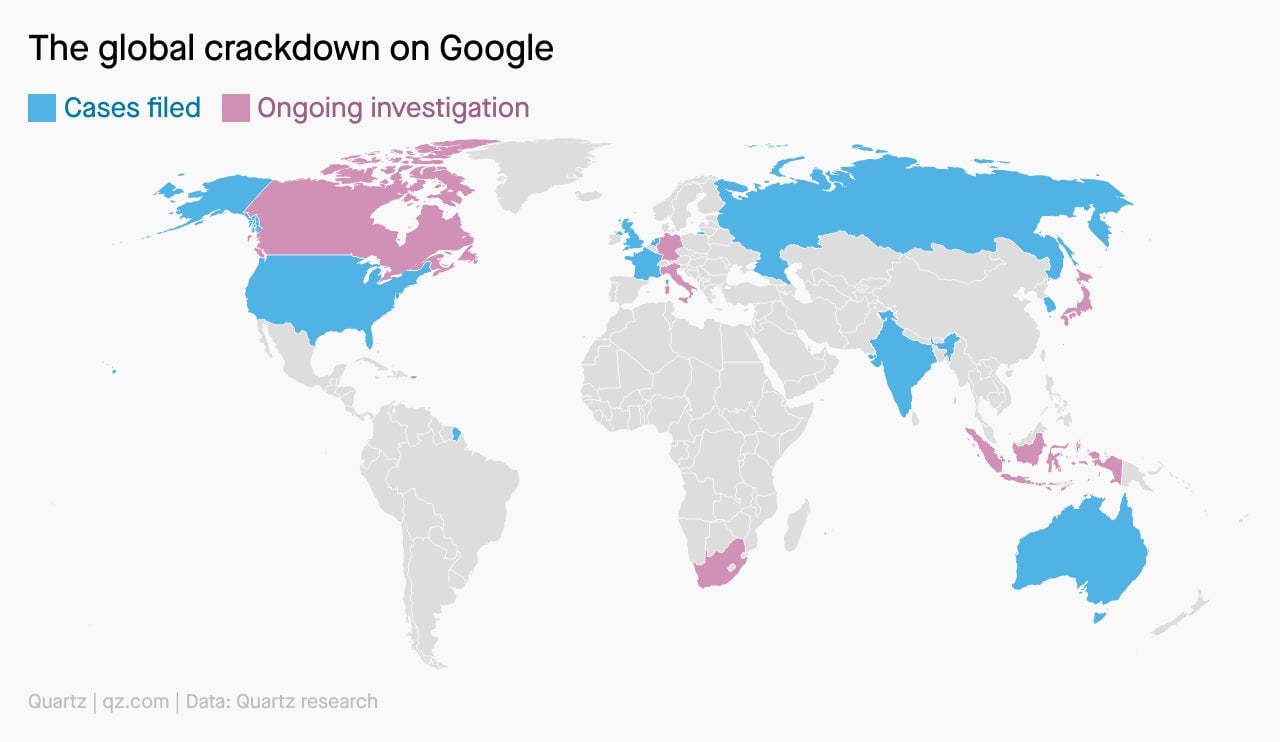Alphabet's soups
Google's parent company is battling waning ad revenues and a host of troubles with governments


Hi Quartz members,
When you’re a company at the top of the world of Big Tech, sometimes the only way to go is down.
Alphabet, the parent company of your favorite search engine (or at least the one you use most often), has had a rough week. First, in India, the largest market for its Android mobile OS, Alphabet was fined $162 million to settle charges that the Google Play Store is anticompetitive. An Indian antitrust agency also ordered Google to stop restricting the use of third-party payment processors, a move that effectively eliminates the tech giant’s 30% cut of paid apps.
Most of Alphabet’s money, though, comes from advertising; Google’s digital advertising stack alone will bring in $80 billion this year. So Alphabet’s bad week got worse when it reported subpar quarterly earnings, showing slower growth in digital advertising revenue. Alphabet raked in $39.5 billion in search ad sales, falling short of analyst expectations of $41 billion. Profit plunged 27% compared to the same quarter the previous year.
The shortfall is a “bad omen” for the entire digital advertising sector, said Evelyn Mitchell, an analyst at Insider Intelligence. (Meta and Snap also reported disappointing ad numbers this quarter.) At YouTube, in particular, ad revenues shrank, Mitchell said, “due in large part to persistent competition in streaming and short video.” In other words: TikTok.
If the market continues to deteriorate, Mitchell added, this past third quarter will signal harder times ahead. At the moment, Alphabet is fighting a paradoxical, dual-pronged battle—against regulators, who think the company is becoming too big, and against the economy, which threatens to shrink the size of the company’s bottom line.
THE MONEYMAKER
Towards the end of 2019, Alphabet began breaking out YouTube’s ad revenues in its earnings reports. Between July and September 2022, YouTube sold around $7 billion worth of ads, registering the first year-on-year slide in revenues since 2019.

The slowdown in digital ad spend is, at least in part, likely to be a product of the moment: a symptom of the wider concern that major economies are heading towards a recession. In the longer term, Alphabet’s digital ad revenues are projected to keep rising, even if the vertiginous growth of 2020-21—a year during which everyone was online all the time, to the delight of advertisers—looks fated to go down as a pandemic aberration.

A WORLD OF TROUBLE
Governments in every continent are now setting up hurdles in the path of Alphabet and its search giant Google, charging the company with antitrust or privacy law violations.

All the countries where Google is already in trouble...
🇪🇺 European Union: Officials are looking into whether Google’s anti-competitive practices have harmed app developers. The company has been fined for stifling competition through the dominance of Android. The EU has already fined Google more than $8.2 billion in recent years over antitrust practices.
🇺🇸 United States: An ongoing lawsuit against Google alleges that the company has monopolized the ad-tech market and beat down competition by abusing its access to data.
🇰🇷 South Korea: A government commission fined Google $50 million for violating privacy laws, using data from other websites as well as apps to generate customized advertisements. Google is also being investigated for potentially violating South Korea’s rules governing in-app payments.
🇬🇧 United Kingdom: Alphabet faces lawsuits over anti-competitive digital advertising practices and over-pricing app store purchases.
🇮🇳 India: The Competition Commission of India has penalized Google for monopolizing its Play Store payment system, and for abusing its dominance in the Android ecosystem.
🇫🇷 France: Google paid $528 million in fines to resolve a dispute related to news publishers displaying copyrighted content.
🇦🇺 Australia: A court ordered Google to pay $43 million in penalties for misleading users on the collection of their personal location data.
🇳🇱 Netherlands: Apart from a lawsuit over its digital advertising practices, Google is also embroiled in a probe over its Play Store payment rules, very similar to the ongoing Indian case.
🇷🇺 Russia: In July, Russia fined Google $34 million for suspending and blocking accounts on its YouTube video service. Google’s Russian subsidiary has already filed for bankruptcy, after the government seized its bank account.
...and all the countries that are stepping up scrutiny
🇮🇩 Indonesia: An antitrust agency is probing Google for potential unfair business practices over its Play Store payment services.
🇯🇵 Japan: An ongoing investigation is determining whether Google has unfairly leveraged its dominance over the markets for phones, smartwatches, and other wearables.
🇿🇦 South Africa: A competition commission has made provisional recommendations for how Google should display search pages, to better distinguish between paid advertising and traditional organic search results. Google promised to “work constructively” with the commission but has not mentioned revamping its search pages.
🇩🇪 Germany: The German government is examining Google’s content licensing deals with news publishers and its data processing terms.
🇮🇹 Italy: An antitrust inquiry is investigating whether Google has abused its dominant position by hindering data portability rights.
🇨🇦 Canada: The Competition Bureau is seeking more information on whether Google behaved in anti-competitive ways in the online advertising industry.
ONE 💵 THING
The various subcategories of Google ads can be a bellwether to see where consumers are reining in their expenditure. In the earnings call this week, Philipp Schindler, Alphabet’s chief business officer, let some hints slip. Companies plugging their insurance, loan, and mortgage products are cutting back on ads, Schindler said. One way to interpret that is to presume that the appetite for such products is declining in anticipation of a recession. During the 2007-09 recession too, according to Federal Reserve data, loan growth plunged and didn’t revive for several quarters.
The other major category in which ad spending declined? Crypto. But that’s a whole other ball game.
QUARTZ STORIES TO SPARK CONVERSATION
- The US housing market’s stagnation has gotten even worse
- The Nile Delta isn’t ready for climate change
- Elon Musk realized he needs Twitter’s advertisers
- North American lumber is moving south
- The guy who inspired the “quiet quitting” movement is back to working 50 hours a week
- Peak fossil fuel use just came into sight
- Behind-the-scenes of my trans transition at work
5 GREAT STORIES FROM ELSEWHERE
💃 The oligarch tango. An investigative report from the The Wall Street Journal uncovers the connections between Bridgewaters, a corporate services firm located on the Isle of Man, and a sprawling network of shell companies that Russian oligarchs are employing to dodge sanctions. Thanks to this web of partnerships, billionaires like Alisher Usmanov have been able to remain invested in Western firms, including in Silicon Valley, while obfuscating their money’s origins.
👋 Move aside, Netflix. A Jakarta-based streaming service is beating out both Netflix and Disney in Indonesia, in part because its homegrown content is tailored to the taste of its domestic audience. Rest of World goes into the other secrets behind Vidio’s success, including its “freemium” pricing model and focus on sporting events—a strategy that could help the platform expand into Southeast Asia, the Middle East, and beyond.
👑 Technofeudalism? Billionaire Elon Musk now owns Twitter, Jeff Bezos owns Amazon, and Mark Zuckerberg owns Meta, each lofty tech king sitting on their algorithmic throne. Does that make us all hi-tech peasants? A piece in Intelligencer lays out the “technofeudalism” thesis, an idea that we’ve transformed beyond capitalism and entered an economic age controlled by Big Tech monopolies. It’s an intriguing idea, but may not stand up to closer scrutiny.
🧛♂️ The villain’s lair. No big baddie is complete without an evil headquarters, and in recent movie history, it’s more often than not a modernist building. Think: Phillip Vandamm’s haunt in Alfred Hitchcock’s North by Northwest or, more recently, freaky Frank’s home in Don’t Worry Darling. Going into the history of maligned mid-century architecture, The New Yorker touches upon films that have drawn on the psychology of modernist designs, and others that have bucked the trend.
👻 Get spooked. A new podcast called “Otherworld” covers all things paranormal, from aliens to ghosts to cryptids, and has garnered a cult following among Gen-Z. The Washington Post discusses how host Jack Wagner’s sleuthing of the supernatural has captured the attention of young people at a time when faith in institutions is on the decline and belief in conspiracy theories is only going up. In the spirit of Halloween, have a read and a listen, and prepare to be spooked.
Thanks for reading! And don’t hesitate to reach out with comments, questions, or topics you want to know more about.
Have a sweet, candy-rich, pleasantly eerie weekend,
— Scott Nover, emerging industries reporter, and Mimansa Verma, India reporter
Additional contributions by Julia Malleck, Alex Citrin-Safadi, and Samanth Subramanian